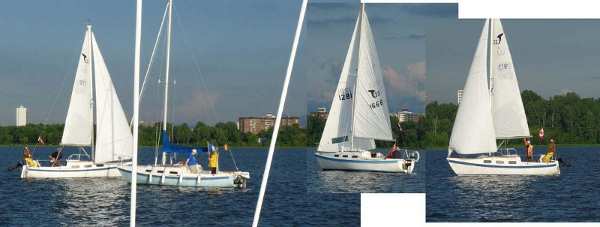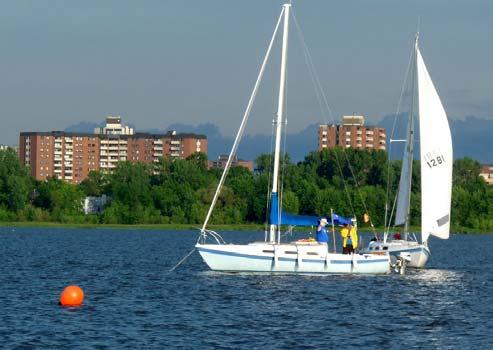By Phil Wilcox. From the NSC Telltale, September 2009. This year, under the auspices of the Tanzer Class Association, we trialed a small program to infect more T22 owners with the racing bug. It started with an e-mail to every non-racing (or thought to be) owner at NSC and BYC, making an enticing offer to come and give it a try. The enticement was the offer to put an experienced T22 racer on any boat that wanted to come out. The response was gratifying, bringing out a few brand new potential racers,however there was also a good response from owners who were fairly new to racingand were very eager to improve. For the clinics we set up essentially a start-line practice. For beginning racers not used to mixing it up at close quarters this is probably the most daunting part of the sport. Lack of wind in June played havoc with scheduling, but we managed enough sessions to settle on a good formula. We set up a normal start line and sequence and had a windward mark about 150-200 yards out. The mini-course was long enough for about two tacks, required some planning on how to get to the windward mark, and ensured enough traffic for a busy rounding. The race was one up-down and took 10-15 minutes from beginning to end, so we were able to get in 5 to 6 starts per evening. When possible, we tried to set the course so there was a longer distance windward mark available for the last race of the evening, allowing for a spinnaker run. This was not always possible as the river is quite busy on a Wednesday night. This format is not suitable for spinnaker practice however we do have an offer on the table for one-on-one spinnaker practice. The nights we sat ashore due to no wind were certainly not wasted. The time was used to check out the boats, advise on rigging, tuning, etc, and just getting to know the people. New racers have an endless list of questions. What was learned? 1. The mini-race format works well to hit many facets of racing. 2. Having an experienced race coach aboard is key. It raises the comfort level of the beginner knowing they will be kept out of trouble. The coach is not the skipper, but was often the one and only crew. 3. For this level of clinic the coach should have experience with that boat as a great deal of the feedback related to boat specific questions. 4. We should do this in June, and only for about 4 weeks. Main problem is, the coaching resource also usually race a couple nights a week, so it can become a burden. It is easy to run the mini-course without coaches, but that seems to have little appeal. With thanks to all those who came out to help and to participate. Get a couple of new people in each year, pretty soon we’ll have a fleet! Blue Mist on race committee |


